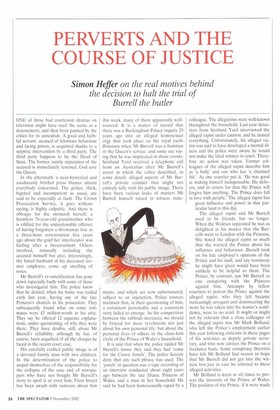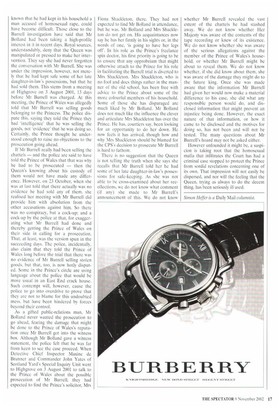PERVERTS AND THE COURSE OF JUSTICE
Simon Heifer on the real motives behind the decision to halt the trial of Burrell the butler
ONE of those bad courtroom dramas on television might have used the scene as a denouement, and then been panned by the critics for its unrealism. A good and faithful servant, accused of felonious behaviour and facing prison, is acquitted thanks to a surprise intervention by a third party. The third party happens to be the Head of State. The former saintly reputation of the accused is immediately restored. God save the Queen.
In the aftermath, a near-hysterical and assiduously briefed press blames almost everybody concerned. The police, thick, bigoted and incompetent as usual, are said to be especially at fault, The Crown Prosecution Service, it goes without saying, is highly culpable. And there is obloquy for the monarch herself, a harmless 76-year-old grandmother who is vilified for the unpardonable offence of having forgotten a throwaway line in a three-hour conversation five years ago about the grief her interlocutor was feeling after a bereavement. Others involved, naturally including the accused himself but also, interestingly, the hated husband of his deceased former employer, come up smelling of roses.
Mr Burrell's re-sanctification has gone down especially badly with some of those who investigated him. The police know that he denied, when his home was raided early last year, having any of the late Princess's chattels in his possession. They subsequently found what on some estimates were £5 million-worth in his attic. They say he offered 12 separate explanations, under questioning, of why they were there. They have doubts, still, about Mr Burrell's reliability, although he has, of course, been acquitted of all the charges he faced in the recent court case.
His carefully crafted public image is of a devoted family man with two children. In the determination of the police to acquit themselves of the responsibility for the collapse of the case and of newspapers who have not bought Mr Burrell's story to spoil it or even him, Fleet Street has been awash with rumours about him this week, many of them apparently wellsourced. It is a matter of record that there was a Buckingham Palace inquiry 20 years ago into an alleged homosexual orgy that took place on the royal yacht Britannia when Mr Burrell was a footman in the Queen's service: and some are saying that he was implicated in those events. Scotland Yard received a telephone call from an Australian after Mr Burrell's arrest in which the caller described, in some detail, alleged aspects of Mr Burrell's private conduct that might not entirely tally with his public image. There have been various leaks of matters Mr Burrell himself raised in witness state ments, and which are now unfortunately subject to an injunction. Police sources maintain that, in their questioning of him, a consistent personality and a consistent story failed to emerge. As the competition between the tabloids increases, we should be braced for more revelations not just about his own personal life, but about the personal lives of others in the close-knit circle of the Prince of Wales's household.
It is said that when the police raided Mr Burrell's house they said they had 'come for the Crown Jewels'. The police fiercely deny that any such phrase was used. The 'jewels' in question was a tape recording of an interview conducted about eight years ago between the late Diana, Princess of Wales, and a man in her household. He said he had been homosexually raped by a
colleague. The allegations were well-known throughout the household. Last year detectives from Scotland Yard interviewed the alleged rapist under caution, and he denied everything. Unfortunately, his alleged victim was said to have developed a mental illness and the police were aware he would not make the ideal witness in court. Therefore no action was taken. Former colleagues of the alleged rapist describe him as 'a bully' and one who has 'a charmed life'. As one courtier put it, 'He was good at making himself indispensable. He delivers, and in return for that the Prince will forgive him anything. The Prince does fall in love with people.' The alleged rapist has great influence and power in that particular land to this day.
The alleged rapist and Mr Burrell used to be friends, but no longer. When the Waleses separated he was as delighted as his master that the Burrells went to London with the Princess. She hated the alleged rapist so much that she warned the Prince about his influence and behaviour. Burrell took on his late employer's opinions of the Prince and his staff, and any testimony he might have given would have been unlikely to be helpful to them. The Prince, by contrast, saw Mr Burrell as one conspiring with the Princess against him. Attempts by fellow courtiers to poison the Prince against the alleged rapist, who they felt became increasingly arrogant and domineering the more he was taken into his master's confidence, were to no avail. It might or might not be relevant that a close colleague of the alleged rapist was Mr Mark Bolland, who left the Prince's employment earlier this year following criticism in these pages of his activities as deputy private secretary, and who now advises the Prince on a freelance basis. Some conspiracy theorists have felt Mr Bolland had reason to hope that Mr Burrell did not get into the witness box just in case he referred to these alleged activities.
Mr Bolland is keen at all times to protect the interests of the Prince of Wales. The position of the Prince, if it were made
known that he had kept in his household a man accused of homosexual rape, could have become difficult. Those close to the Burrell investigation have said that Mr Bolland had been taking a high-profile interest in it in recent days. Royal sources, understandably, deny that the Queen was manipulated or pressed to make her intervention. They say she had never forgotten the conversation with Mr Burrell. She was under the impression, however, not merely that he had kept safe some of her late daughter-in-law's possessions, but that he had sold them. This stems from a meeting at HiOgrove on 3 August 2001, 13 days before Mr Burrell was charged. At this meeting, the Prince of Wales was allegedly told that Mr Burrell was selling goods belonging to the Princess. The police dispute this, saying they told the Prince they had 'intelligence' that he was selling the goods, not 'evidence' that he was doing so. Certainly, the Prince thought he understood enough to raise no objections to the prosecution going ahead.
If Mr Burrell really had been selling the chattels — and the police are said to have told the Prince of Wales that that was why he had to be prosecuted — then the Queen's knowing about his custody of them would not have made any difference. However, on 23 October, when she was at last told that there actually was no evidence he had sold any of them, she realised her meeting with Mr Burrell did provide him with absolution from the other accusations against him. So there was no conspiracy, but a cock-up; and a cock-up by the police at that, for exaggerating what Mr Burrell had done and thereby getting the Prince of Wales on their side in calling for a prosecution. That, at least, was the version spun in the succeeding days. The police, incidentally, also claim that they told the Prince of Wales long before the trial that there was no evidence of Mr Burrell selling stolen goods, but that, too, is now hotly disputed. Some in the Prince's circle are using language about the police that would be more usual in an East End crack house. Such contempt will, however, cause the police to go into overdrive to prove that they are not to blame for this undoubted mess, but have been hindered by forces beyond their control.
As a gifted public-relations man, Mr Bolland never wanted the prosecution to go ahead, fearing the damage that might be done to the Prince of Wales's reputation once Mr Burrell got into the witness box. Although Mr Bolland gave a witness statement, the police felt that he was far from keen to see the case proceed. When Detective Chief Inspector Maxine de Brunner and Commander John Yates of Scotland Yard's Special Inquiry Unit went to Highgrove on 3 August 2001 to talk to the Prince of Wales about the possible prosecution of Mr Burrell, they had expected to find the Prince's solicitor, Mrs Fiona Shackleton, there. They had not expected to find Mr Bolland in attendance, but he was. Mr Bolland and Mrs Shackleton do not get on. His acquaintances now say he has her firmly in his sights or, in the words of one, 'is going to have her legs off'. In his role as the Prince's freelance spin doctor, his first priority is going to be to ensure that any opprobrium that might otherwise attach to the Prince for his role in facilitating the Burrell trial is diverted to Mrs Shackleton. Mrs Shackleton, who is no fool and does things rather in the manner of the old school, has been free with advice to the Prince about some of the more colourful members of his household. Some of those she has disparaged are much liked by Mr Bolland. Mr Bolland does not much like the influence the clever and articulate Mrs Shackleton has over the Prince. He has. courtiers say, been looking for an opportunity to do her down. He now feels it has arrived, though how and why Mrs Shackleton should be blamed for the CPS's decision to prosecute Mr Burrell is hard to fathom.
There is no suggestion that the Queen is not telling the truth when she says she recalls that Mr Burrell told her he had some of her late daughter-in-law's possessions for safe-keeping. As she was not able to be cross-examined about her recollections, we do not know what comment (if any) she made to Mr Burrelrs announcement of this. We do not know whether Mr Burrell revealed the vast extent of the chattels he had stashed away. We do not know whether Her Majesty was aware of the contents of the tape recording or knew of its existence. We do not know whether she was aware of the serious allegations against the member of the Prince of Wales's household, or whether Mr Burrell might be about to reveal them. We do not know whether, if she did know about them, she was aware of the damage they might do to the future king. Once she was made aware that the information Mr Burrell had given her would now make a material difference to his case, she did what any responsible person would do, and disclosed information that might prevent an injustice being done. However, the exact nature of that information, or how it came to be disclosed and the motives for doing so, has not been and will not be tested. The many questions about Mr Burrell's hoard may not be asked either.
However unfounded it might be, a suspicion is taking root that the homosexual mafia that infiltrates the Court has had a criminal case stopped to protect the Prince from sordid revelations concerning one of its own. That impression will not easily be dispersed, and nor will the feeling that the Queen, trying as always to do the decent thing. has been seriously ill used.
Simon Heifer is a Daily Mail columnist.



















































































































 Previous page
Previous page